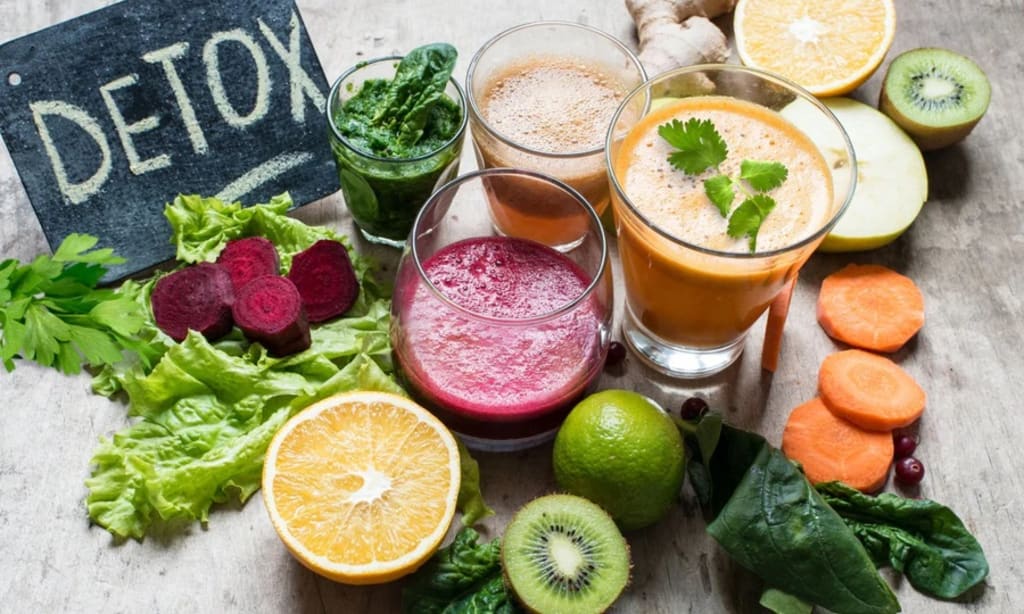The Detox Dilemma:
Cleansing Your Body for Health and Happiness

The Story of Detox: Renewing Your Body Inside Out
In a world where fast food and pollution are rampant, the idea of detoxing the body has gained significant traction. Detoxification is often hailed as a miracle solution for improved health, weight loss, and increased energy. But what does detoxing truly involve, and what are the real benefits and potential risks?
Understanding Detoxification
Detoxification, or detox, refers to the process of removing toxins from the body. Our bodies are equipped with a natural detoxification system, including the liver, kidneys, lungs, and skin. These organs work together to filter out harmful substances and maintain our health. However, the modern lifestyle—characterized by processed foods, environmental pollutants, and stress—can overburden these systems, leading to the belief that we need to support our bodies through intentional detox practices.
Popular Detox Methods
There are several methods people use to detoxify their bodies. Some of the most popular include:
1. Juice Cleanses
Juice cleanses involve consuming only fresh vegetable and fruit juices for a set period, typically ranging from a few days to a week. This method is believed to flood the body with essential nutrients while giving the digestive system a break.
2. Intermittent Fasting
Intermittent fasting involves cycling between periods of eating and fasting. Common methods include the 16/8 method (16 hours of fasting, 8 hours of eating) or the 5:2 method (eating normally for five days, consuming very few calories for two days).
3. Water Fasting
Water fasting is a more extreme approach where individuals consume only water for a certain period, usually 24-72 hours. This method aims to rest the digestive system completely and trigger autophagy, a process where the body cleans out damaged cells.
4. Detox Diets
Detox diets typically involve eating whole, unprocessed foods while eliminating sugar, caffeine, alcohol, and refined grains. These diets often include high amounts of fruits, vegetables, lean proteins, and whole grains to support the body's natural detoxification processes.
5. Herbal Teas and Supplements
Herbal teas and supplements, such as dandelion root, milk thistle, and turmeric, are believed to support liver function and promote detoxification. These are often used in conjunction with other detox methods.
Duration and Expected Outcomes
The duration of a detox can vary depending on the method and individual goals. Short-term detoxes, like juice cleanses and water fasts, typically last between 1-7 days. Intermittent fasting and detox diets can be incorporated as part of a long-term lifestyle change.
Expected outcomes of a successful detox can include:
Increased Energy Levels: By eliminating processed foods and sugar, many people report feeling more energetic.
Weight Loss: Detoxing can lead to weight loss, particularly if it involves fasting or a significant reduction in calorie intake.
Improved Digestion: Giving the digestive system a break can alleviate bloating, constipation, and other digestive issues.
Enhanced Mental Clarity: Many individuals report improved focus and mental clarity during and after a detox.
Better Skin Health: Detoxification can lead to clearer, more radiant skin as the body eliminates toxins.
Risks and Considerations
While detoxing can offer several health benefits, it's essential to be aware of the potential risks:
1. Nutrient Deficiencies
Restrictive detox diets or prolonged fasting can lead to nutrient deficiencies if not done correctly. It's crucial to ensure that your body is still receiving essential vitamins and minerals.
2. Dehydration
Water fasting or consuming only juices can result in dehydration if adequate fluids are not consumed.
3. Blood Sugar Fluctuations
People with diabetes or other blood sugar-related conditions should be cautious with fasting or juice cleanses, as these can lead to significant fluctuations in blood sugar levels.
4. Muscle Loss
Extended periods of low-calorie intake can cause muscle loss, particularly if protein intake is inadequate.
Professional Insights and Case Studies
Several studies have explored the effects of detox diets and fasting:
1. The Journal of Alternative and Complementary Medicine (2014)
A study published in this journal found that a seven-day juice cleanse resulted in significant weight loss and improved markers of cardiovascular health, such as reduced cholesterol levels. Participants also reported increased energy levels and improved digestion.
2. Intermittent Fasting Studies
Research on intermittent fasting has shown promising results. A study published in the journal Cell Metabolism (2015) found that intermittent fasting can improve insulin sensitivity, reduce inflammation, and promote weight loss. Additionally, a review in Annual Review of Nutrition (2017) highlighted the benefits of intermittent fasting for metabolic health and longevity.
3. Detox Diets and Liver Health
A study in the journal Hepatology (2012) investigated the effects of a detox diet on liver health. The results indicated that participants following a detox diet had improved liver function and reduced levels of liver enzymes, suggesting a positive impact on liver health.
Personal Story: Emma's Detox Journey
Emma, a 45-year-old marketing executive, decided to embark on a detox journey after feeling constantly fatigued and battling frequent digestive issues. She chose a combination of intermittent fasting and a plant-based detox diet. For one month, she followed the 16/8 intermittent fasting method and consumed mainly fruits, vegetables, whole grains, and lean proteins.
During the first week, Emma experienced some challenges, including headaches and irritability, likely due to caffeine withdrawal. However, by the second week, she noticed significant improvements in her energy levels and digestion. Her skin started to clear up, and she felt more focused at work.
By the end of the month, Emma had lost 8 pounds, and her digestion had improved markedly. She felt rejuvenated and decided to incorporate elements of her detox routine into her long-term lifestyle, such as intermittent fasting and a plant-based diet.
Conclusion
Detoxing the body can offer numerous health benefits, including increased energy, weight loss, improved digestion, enhanced mental clarity, and better skin health. However, it's essential to approach detoxification with caution, understanding the potential risks and ensuring a balanced intake of nutrients.
Professional studies and personal experiences highlight the positive impacts of detoxing, but it's crucial to tailor the approach to individual needs and health conditions. Consulting with a healthcare professional before starting any detox regimen is recommended to ensure safety and effectiveness.
By embracing a thoughtful and well-planned detox, individuals can potentially transform their health and well-being, paving the way for a more vibrant and energetic life.
About the Creator
Dave Karpinsky, PhD, MBA
A world traveler, educator, consultant, entrepreneur, husband and a father sharing his experience and wisdom. Join me as I weave my narrative, offering a window into a life lived fully and passionately. Please subscribe :-)
Enjoyed the story? Support the Creator.
Subscribe for free to receive all their stories in your feed. You could also pledge your support or give them a one-off tip, letting them know you appreciate their work.






Comments
There are no comments for this story
Be the first to respond and start the conversation.